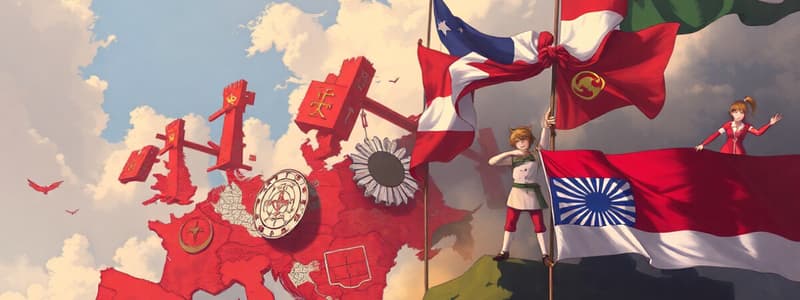Podcast
Questions and Answers
What marked the first phase of the emergence of nations in Western Europe?
What marked the first phase of the emergence of nations in Western Europe?
- The establishment of the Habsburg Monarchy
- The state precedes the nation with responsible citizenship (correct)
- The rise of cultural nations like Italy and Germany
- A shift towards feudalism in local governance
Which statement accurately describes the political consequences of nationalism?
Which statement accurately describes the political consequences of nationalism?
- Increase in nation-states and rise of self-governance (correct)
- Strengthening of multinational empires
- Reduction of cultural assimilation among minorities
- Enhancement of feudal systems
What was a primary effect of the emergence of the working class during the industrial revolution?
What was a primary effect of the emergence of the working class during the industrial revolution?
- Diminished power of the bourgeoisie
- A harmonious relationship between rulers and the ruled
- Complete abolition of the industrialization process
- A rise in social tensions and ideologies like socialism (correct)
Which scenario depicts the second phase of the emergence of nations in Central/Southern Europe?
Which scenario depicts the second phase of the emergence of nations in Central/Southern Europe?
What major conflict arose due to tensions among nation-states resulting from nationalism?
What major conflict arose due to tensions among nation-states resulting from nationalism?
Flashcards
Emergence of Nations
Emergence of Nations
A period of time in Europe where kingdoms and states with differing identities transitioned into singular, unified nations.
Phase 1: Western Europe
Phase 1: Western Europe
Western European nations like England, France, and the Netherlands transitioned from a system of feudal lords and monarchs to a state-led governance where citizens have a say in their political affairs.
Phase 2: Central/Southern Europe
Phase 2: Central/Southern Europe
Countries like Italy and Germany were formed by unifying groups of people who shared a common culture and language, but lacked a strong central government initially.
Phase 3: Eastern Europe
Phase 3: Eastern Europe
Signup and view all the flashcards
Nationalism
Nationalism
Signup and view all the flashcards
Study Notes
Assignment 1 Learning Goals
-
Three phases of nation emergence
- Western Europe (England, Netherlands, France, Sweden): moved from old regimes to self-governing societies of responsible citizens; the state came before the nation. Belgium and Ireland were exceptions due to their secessionist status.
- France went from divided regions to centralized state power where kings controlled local lords.
- Central/Southern Europe: Smaller, culturally distinct states formed nations before becoming states.
- Eastern Europe: Smaller nations separated from large multinational empires like the Ottoman and Habsburg Empires.
-
Political consequences of nationalism
- End of feudalism
- Dismantling of multinational empires
- Rise of nation-states
- Fall of monarchies (e.g., Habsburgs)
- Tensions among nation-states, leading to WWI
- Minority assimilation
Assignment 2
-
Problem statement: How did the working class emergence impact rulers/ruled relationships?
-
Brainstorm:
- Industrial Revolution
- New ideologies (socialism, liberalism, conservatism)
- "Social question"
- Industrialization changes
- Rise of the bourgeoisie and proletariat classes
Studying That Suits You
Use AI to generate personalized quizzes and flashcards to suit your learning preferences.




